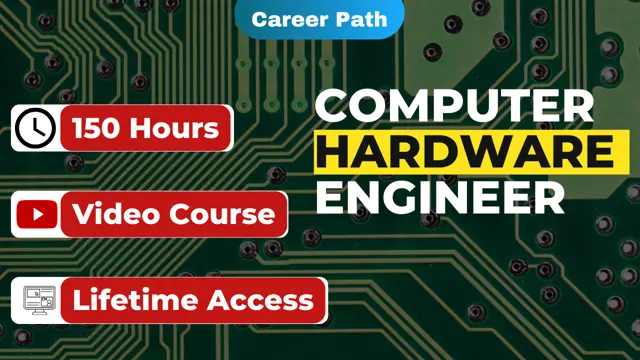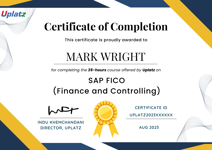
Computer Hardware Engineer Career Path
Self-paced videos, Lifetime access, Study material, Certification prep, Technical support, Course Completion Certificate
Uplatz
Summary
- Uplatz Certificate of Completion - Free
Add to basket or enquire
Overview
Uplatz provides this comprehensive Career Path program to help you become a successful Computer Hardware Engineer. It is a program covering all topics related to Computer Hardware Engineering in the form of self-paced video tutorials. You will be awarded Course Completion Certificate at the end of the course.
Courses covered in this Computer Hardware Career Track program are:
- Computer Hardware Engineering
- How to become Embedded Engineer (Firmware - Software - Hardware)
- Assembly Language using ATMEL AVR Microcontroller
- VLSI - PLC - Microcontrollers - Assembly Language
- FPGA Design & Implementation
- Embedded Systems and MATLAB Programming
- Legacy Embedded Systems
- Digital Signal Processing (DSP)
- Digital System Design with VHDL & Verilog
- Internet of Things (IoT) Basics
- Linux and Embedded Linux
- Embedded C Programming
A computer hardware engineer (often called a computer engineer) builds all kinds of computer systems, from the next generation of smart phones to the control systems in a smart car to a 3D printer. They also work on designing individual computer components. In contrast, software engineers write code to teach computers how to run. Hardware and software computer engineers hold very different skill sets, yet their work comes together in finished computer products.
Computer Hardware Engineer
Most computer hardware engineers work in labs. However, some work in manufacturing plants to ensure top-quality production. They study computer or electrical engineering and have extensive knowledge of the physical components of computers, like circuit boards, processors, chips, and electronic equipment. They display excellent problem-solving and troubleshooting skills. Computer hardware engineers tend to work for computer systems design companies. They spend the majority of their day sitting and often work over 40 hours a week.
- Assemble and test the electrical components of computers
- Create models and prototypes
- Present prototypes to their team, upper-level management, and investors
- Help a company update their computer systems
Professionals who design and develop hardware components for computer systems are known as computer hardware engineers. They might be working on new CPUs, circuit boards, input/output ports, and storage devices, among other things that are essential to our digital existence. As a result, they must be able to balance the demands of software with the limitations and capabilities of the hardware that executes it.
Engineers who work in the field of computer hardware create things. To become a computer hardware engineer, you'll need a collection of tools, diagnostic equipment, and a brilliant concept. A computer hardware engineer, often known as a computer engineer, is a scientist who spends their days developing, testing, and refining new computing equipment for a variety of purposes in a laboratory. Others may focus on larger goods while others spend countless hours using microscopes to produce nanotechnology that aims for microscopic computer and storage systems.
To be a great computer and hardware engineer, you'll require a wide range of high-tech abilities. Most importantly, you must have a strong mathematical foundation, including high-level Calculus. You should also have prior programming and computer science experience. Being able to communicate in a variety of languages, operating systems, and network kinds would be beneficial. Computer hardware engineers must also have a high level of patience and the capacity to be critical of themselves without sabotage. That's because you'll be putting your assumptions and outcomes to the test on a regular basis. Every step you take on the path to creativity will be scrutinized, tested, and scrutinized again. Because this procedure takes a long time, the top computer hardware engineers must be able to go through it until you get the best results and account for all the factors.
The field of computer engineering is at the crossroads of technology and innovation. Computer engineering is a dynamic professional discipline that provides a variety of career pathways in hardware engineering (e.g., microprocessors) and software development, both of which drive computing developments in sectors ranging from aerospace to healthcare.
Course media
Description
Course Objectives
- New hardware systems, computer components, and peripherals are designed, built, and tested.
- Using AutoCAD or similar drafting application, create plans for new computer systems.
- Electronic circuits, assemblies, and other electrical components are designed, tested, and optimized.
- Recommend computer systems and peripherals to end-users depending on their business requirements.
- Build non-computer items, such as medical gadgets and vehicles, with embedded IT systems.
- Update current computer systems to ensure that they are compatible with the most recent software releases.
- Use soft skills like problem-solving creativity and effective oral/written communication.
- It's possible that you'll be able to help sales and marketing employees explain new hardware systems to potential clients.
- Have a basic understanding of computer programming and software development.
- Use trade instruments such as circuit testers, electronic measuring probes, oscilloscopes, mustimeters, frequency analyzers, and a variety of scientific and analytical software solutions to their full potential.
Computer hardware engineers research, design, develop, and test computer systems and components such as processors, circuit boards, memory devices, networks, and routers. These engineers discover new directions in computer hardware, which generate rapid advances in computer technology. Computer hardware engineers usually work in research laboratories that build and test various types of computer models. Most work in high-tech manufacturing firms. Whether you are playing video games, surfing the Internet, or writing a term paper, computers are an integral part of our daily lives. Computer hardware engineers work to make computers faster, more robust, and more cost-effective. They design the microprocessor chips that make your computer function, along with the equipment that makes computing easy and fun to do.
Most Important Knowledge Areas for Computer Hardware Engineers
- Computers and Electronics—Knowledge of circuit boards, processors, chips, electronic equipment, and computer hardware and software, including applications and programming.
- Engineering and Technology—Knowledge of the practical application of engineering science and technology. This includes applying principles, techniques, procedures, and equipment to the design and production of various goods and services.
- Design—Knowledge of design techniques, tools, and principles involved in production of precision technical plans, blueprints, drawings, and models.
- Mathematics—Knowledge of arithmetic, algebra, geometry, calculus, statistics, and their applications.
- Physics—Knowledge and prediction of physical principles, laws, their interrelationships, and applications to understanding fluid, material, and atmospheric dynamics, and mechanical, electrical, atomic and sub- atomic structures and processes.
- English Language—Knowledge of the structure and content of the English language including the meaning and spelling of words, rules of composition, and grammar.
- Telecommunications—Knowledge of transmission, broadcasting, switching, control, and operation of telecommunications systems.
- Production and Processing—Knowledge of raw materials, production processes, quality control, costs, and other techniques for maximizing the effective manufacture and distribution of goods.
- Education and Training—Knowledge of principles and methods for curriculum and training design, teaching and instruction for individuals and groups, and the measurement of training effects.
- Mechanical—Knowledge of machines and tools, including their designs, uses, repair, and maintenance.
This Computer Hardware Engineer program provides a high-level overview of computer engineering, including numerous career options, relevant skills and technology, income potential, and job forecast. To enhance digital technologies, computer networking, and computer systems, computer engineering combines computer science with electrical engineering. Computer engineers, on the other hand, use their comprehensive understanding of hardware and software design as well as computer programming to improve the efficiency and effectiveness of computing platforms and applications. Computer engineers create new computer hardware, design and implement software programs, and improve the capabilities of networks and communications systems by seamlessly integrating the newest advances.
Who is this course for?
Everyone
Requirements
Passion and determination to succeed!
Career path
- Computer Hardware Engineer
- Embedded Systems Engineer
- Software & Firmware Engineer
- GPU Hardware Engineer
- Hardware Validation Engineer
- Electronics Engineer (Hardware & Software)
- Hardware Team Leader
- Director, Compute Hardware Engineering
- Electronics/Hardware Design Engineer
- IT Support Engineer
- VLSI & PLCs Designer
- MATLAB Programmer
- DSP, Verilog & VHDL Designer
- Embedded C & Embedded Linux Programmer
Questions and answers
Currently there are no Q&As for this course. Be the first to ask a question.
Certificates
Uplatz Certificate of Completion
Digital certificate - Included
Course Completion Certificate by Uplatz
Reviews
Currently there are no reviews for this course. Be the first to leave a review.
Legal information
This course is advertised on reed.co.uk by the Course Provider, whose terms and conditions apply. Purchases are made directly from the Course Provider, and as such, content and materials are supplied by the Course Provider directly. Reed is acting as agent and not reseller in relation to this course. Reed's only responsibility is to facilitate your payment for the course. It is your responsibility to review and agree to the Course Provider's terms and conditions and satisfy yourself as to the suitability of the course you intend to purchase. Reed will not have any responsibility for the content of the course and/or associated materials.



